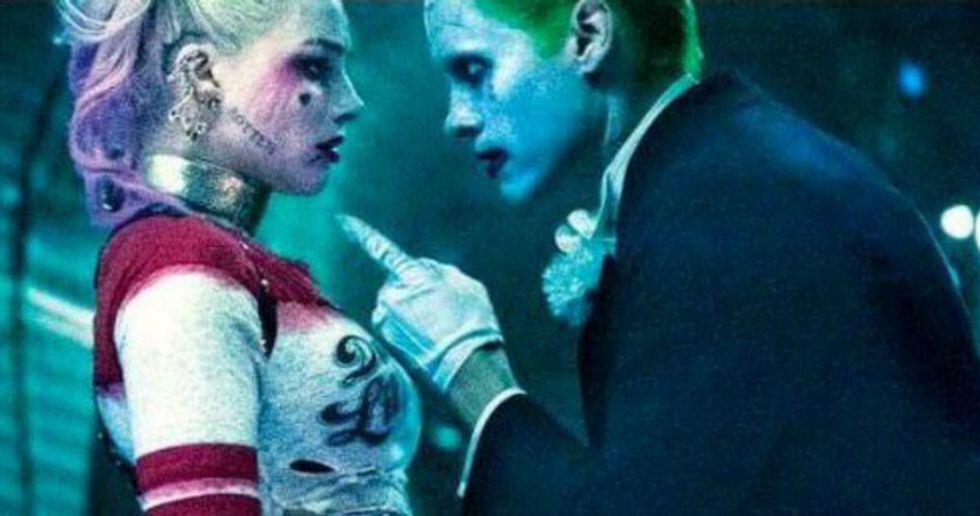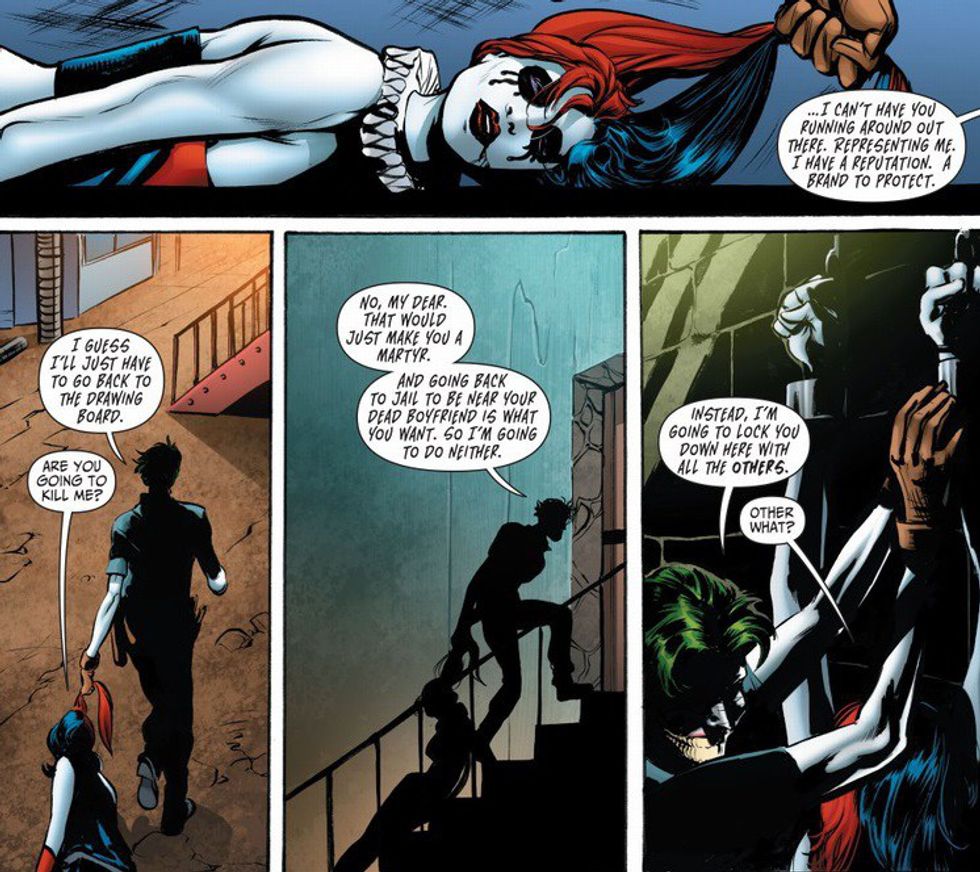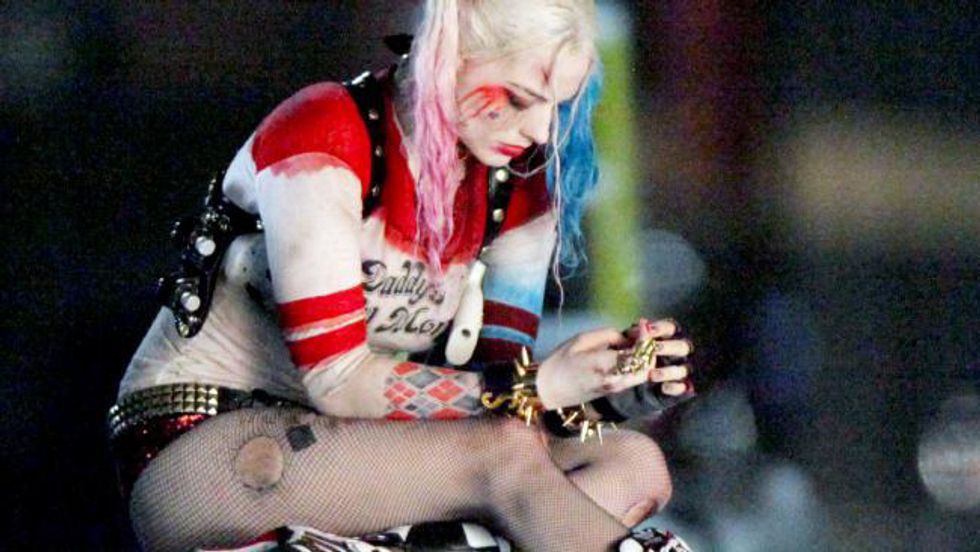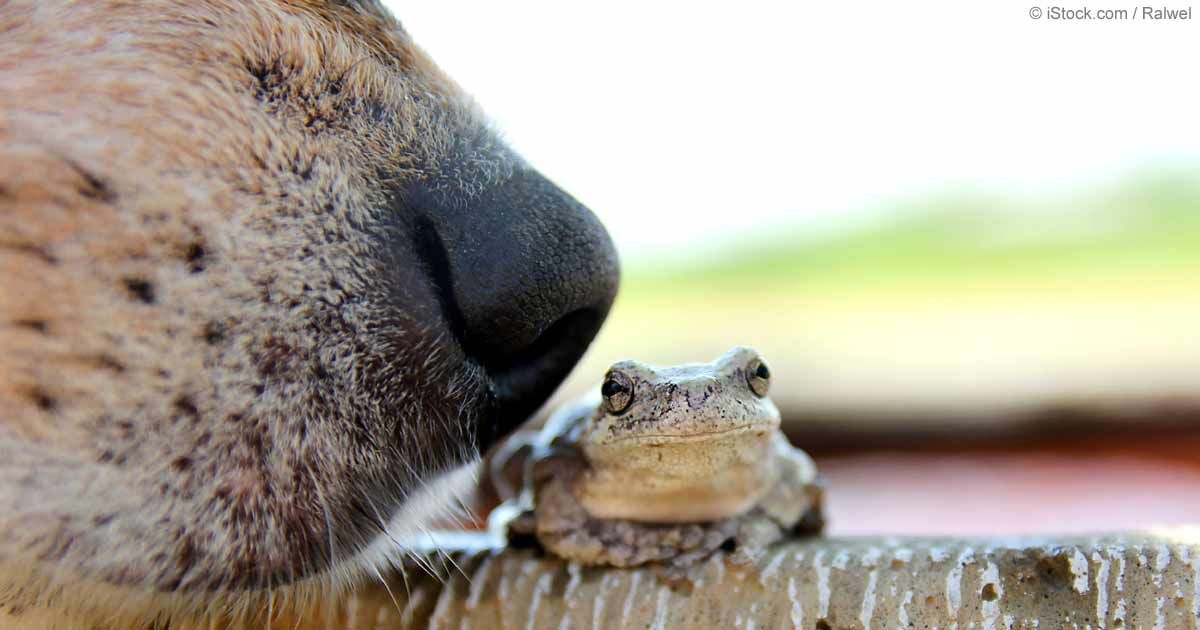It's impossible not to see an advertisement for DC Comic's newest film endeavor, "Suicide Squad," on any given day. With its flashy, "in your face" attitude laced campaigning, it welcomes a whole new crop of viewers to the DC Universe along with a whole new supporting cast of villains, but namely, the ever popular Harley Quinn. Harley has lived countless lives, from television to print comic, since her inception in "Batman: The Animated Series." She's often well received for her bright, outgoing personality against the darker undertones of the "Batman" franchise itself -- Harley isn't afraid to chat it up during a fight or trace along her dark sense of humor while swinging her ever famous mallet right into your face. Harley lives as a seemingly "free" character—- no rules, no restrictions... But she is truly a character in chains, and that entrapment lives in her linkage with the Joker.
Time and time again, Harley and Joker are misguidedly campaigned as an equal match. They are forced into a realization of "relationship goals" by gassed up insinuations of "her crazy matches his crazy," "he understands her," etc., while merchandizers have a field day with this warped perception, slapping loving embraces between the "couple" on any tee shirt they can find, venturing even to the audacious presumption that the two share an aesthetic appeal in their "bantering." When the truth of the matter is this: Joker has only ever physically and emotionally abused Harley Quinn.
Their relationship is nothing to dote over or romanticize — it is something that even writers of the comics themselves have begged fans to condemn. A nightmare on page (and now on screen) that is all too real for the many women and men suffering through abusive domestic situations every day.
Before Harley Quinn took up her moniker, she was psychiatrist Dr. Harleen Quinzel — a fiercely intelligent young woman with a tenacity to succeed and flourish within her field. She was strong willed, but most importantly, independent. An independence that shined through in her work -- when something caught her interest, nobody was going to tell her "no." She was going to fight tooth and nail for it -- work her way up as fast as she could to pursue a subject she believed would widen her psychiatric field of understanding at Arkham Asylum — a psychopathic, malicious, murderous inmate named The Joker.
And that's where it all spiraled out of control...
The Joker used their therapy sessions to gradually entrap Harleen within the most fragile of instruments -- the heart. Touting himself as a charismatic, misunderstood soul -- the type of soul, he knew she'd desperately want to save. Building about their conversations a sympathy; a false endearment he could twist and turn at his disposal. Flipping the tables on his "dear psychiatrist" and taking on the role of toying with her mind. Crafting her into his "perfect" servant. Someone he could poke and prod around his will for his own personal gain and self sufficiency. Spreading and thinning out her own mental health and twisting it along the dependency of his approval and accommodations.
So much so, Harleen dropped all that she was and turned to a life of crime in order to appease the man she believed loved her. Letting The Joker's twisted game consume her affections —- Harley Quinn was born.
The entire character herself was born by The Joker's mental manipulation and emotional abuse, using her weaknesses only to create his own gains without one ounce of care. That itself should speak volumes to an audience, but unfortunately seems to have gotten lost in translation.
The joke isn't funny anymore.
The Joker physically and verbally abuses Harley; he is just as vicious to her as he is with everyone else. Constantly berating and mutilating her, one more sadistic than the next. Harley is nothing to him but a cronie he can guide along on a leash until she no longer holds any value to him. There is nothing romantic about how The Joker treats Harley. Yet, no matter how monstrous, Harley reacts like most victims of domestic abuse.
She shrugs it off thinking — but he loves me, right? That it's all his temper. That she was just in the wrong place at the wrong time. That he didn't mean to hurt her. That in the end he still cares for her. That they both love each other. And even more so -- if he is all she has, this is all she deserves. That her identity, forever warped, must be reliant on The Joker himself. Where else would she go? That love requires sacrifice. He must have loved her once -- he'd always love her again.
But, at what cost?
No relationship should ever strive to emulate, or worse, mirror that of Joker and Harley. No human being deserves to suffer at the hand of another, let alone someone they believe they love.
By silencing Harley's voice in favor of chaining her to The Joker, her story is distorted into an "acceptability" — a felonious misconduct warping into a threshold of what a relationship should be like.
Harley Quinn was crafted to teach a dark reality. One that unfortunately still lives in our very society. Meant to reflect the dangers of abusive partnerships. Her excusing character doesn't work as an approval method, as many tend to use in defense of the glamorization of this relationship, but instead reflects a sad truth. So many real life people are suffering at the hands of abusers, excusing abusers for such love lost. Harley is only one fictional depiction of the many REAL people trapped in her very same bonds. Even alerting young people to the signs of realization to their own unhealthy connections.
If you or anyone you know relate to the Joker and Harley Quinn relationship or exhibit any of the following signs listed here at The Joyful Heart Foundation — please seek IMMEDIATE help. Contact local authorities or the 24/7 Free and Anonymous Domestic Violence Hotline at 800.621.HOPE (4673)
No human being deserves to live in fear.
No human being deserves to be treated anything short of being respected, loved, and treasured for all that they are.
So please, for the love of all those past, present, and future who have been victim to such cruelty: stop romanticizing The Joker and Harley Quinn.
























 sunrise
StableDiffusion
sunrise
StableDiffusion
 bonfire friends
StableDiffusion
bonfire friends
StableDiffusion
 sadness
StableDiffusion
sadness
StableDiffusion

 purple skies
StableDiffusion
purple skies
StableDiffusion

 true love
StableDiffusion
true love
StableDiffusion
 My Cheerleader
StableDiffusion
My Cheerleader
StableDiffusion
 womans transformation to happiness and love
StableDiffusion
womans transformation to happiness and love
StableDiffusion
 future life together of adventures
StableDiffusion
future life together of adventures
StableDiffusion





















